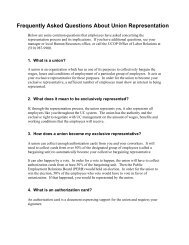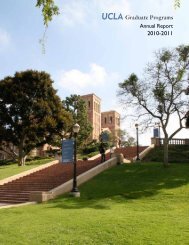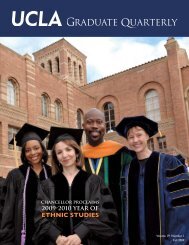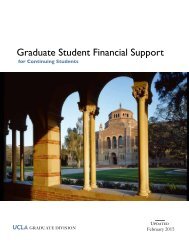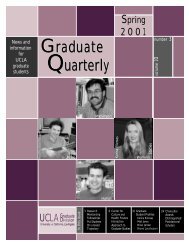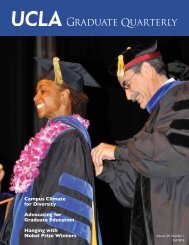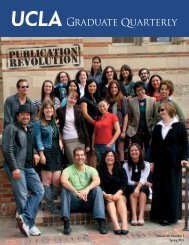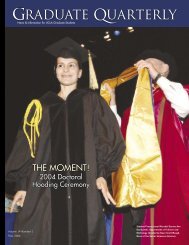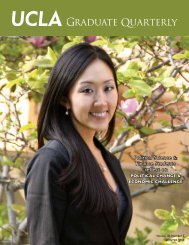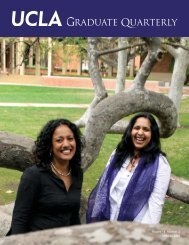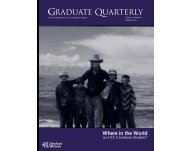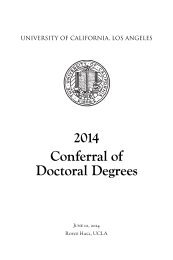Graduate Quarterly - Winter 2008 - UCLA Graduate Division
Graduate Quarterly - Winter 2008 - UCLA Graduate Division
Graduate Quarterly - Winter 2008 - UCLA Graduate Division
You also want an ePaper? Increase the reach of your titles
YUMPU automatically turns print PDFs into web optimized ePapers that Google loves.
share that with the class,” she says. “I help<br />
students cultivate strong and persuasive<br />
voices for articulating their ideas by way of<br />
music.” And in a volunteer assignment with<br />
autistic students at Rosewood Elementary<br />
School, she engages them in alternative<br />
modes of expression. After a class on conducting,<br />
one of her young students went<br />
home, put Fantasia in the DVD player, and<br />
demonstrated his new skill. His parents told<br />
Marcie it was the first time he had been able<br />
to tell them about his day.<br />
“I help students cultivate<br />
strong and persuasive<br />
voices for articulating their<br />
ideas by way of music.”<br />
Marcie Lynn Ray<br />
Musicology<br />
EVEN IN THE DEPARTMENT<br />
of Musicology, teachers don’t<br />
routinely burst into song, but<br />
Marcie Lynn Ray, who has<br />
extensive voice training, finds doing so a<br />
lot easier than “fumbling around with a<br />
CD.” Sometimes, she offers a passage from<br />
the opera under study, or “I can just sing a<br />
phrase to explain expression or timbre or<br />
articulation—all the things that make up<br />
a performance,” she says. As a result, she<br />
raises her voice in class “often enough that<br />
it’s become the trademark of what I do” as<br />
a teaching assistant.<br />
Voice also plays a metaphorical role in<br />
her classroom philosophy, as she encourages<br />
her students, many of them nonmajors, “to<br />
find their own way into the music and to<br />
Faculty and students agree that Marcie<br />
is a virtuoso lecturer. As Sean R. Silver, a<br />
former student, puts it, “her classes are as<br />
poetically dense as the musical texts which<br />
are her objects—highly orchestrated performances<br />
of intellectual virtuosity which<br />
achieve that rarest of academic effects,<br />
the sensation . . . that the students have<br />
produced a complicated thesis all by themselves.”<br />
Department Chair Raymond Knapp<br />
says she is “highly disciplined.” While she<br />
“makes what she teaches accessible, she also<br />
grounds the study of music within culture<br />
and history and brings critical discourses to<br />
bear on her topic as appropriate.”<br />
Marcie was well on her way to becoming<br />
a professional singer when doing five<br />
auditions in five days in five different<br />
cities led her to question whether this was<br />
the sort of high-stress life she wanted to<br />
lead. Her answer was no, and a teaching<br />
career became the most attractive option:<br />
“That way I could share my love for things<br />
I do.” After completing her dissertation on<br />
eighteenth-century French comic opera,<br />
Marcie hopes to find a teaching position<br />
at a small liberal arts college. “Teaching<br />
students to list critically to music is not<br />
just about engaging with music,” she<br />
says, “but about creating a new way for<br />
them to think critically about the world<br />
around them.”<br />
<strong>Winter</strong> <strong>2008</strong> GRADUATE QUARTERLY<br />
15



